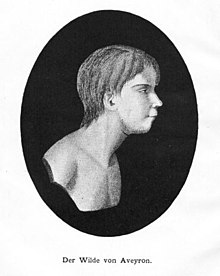Victor of Aveyron
Victor of Aveyron | |
|---|---|
 Victor's portrait from the front cover of the book about him. | |
| Born | approximately 1785 unknown |
| Died | 1828 Paris, France |
| Nationality | unknown |
| Other names | The Wild Boy of Aveyron |
| Known for | being a feral child |
Victor of Aveyron (also The Wild Boy of Aveyron) was a feral child who apparently lived his entire childhood naked and alone in the woods before being found wandering the woods near Saint-Sernin-sur-Rance, France in 1797. He was captured, but soon escaped. He was then captured again and kept in the care of a local woman for about a week before he escaped once more.
However, on January 8, 1800, he emerged from the forests on his own. His age was unknown but citizens of the village estimated that he was about twelve years old. His lack of speech, as well as his food preferences and the numerous scars on his body, indicated that he had been in the wild for the majority of his life.
Study
Shortly after Victor was found, a local abbot and biology professor, Pierre Joseph Bonnaterre, examined him. He removed the boy's clothing and led him outside into the snow, where, far from being upset, Victor began to frolic about in the nude, clearly accustomed to exposure and cold.
It was clear that Victor could hear, and he was taken to the National Institute of the Deaf for the purpose of study. In the context of the Enlightenment, when many were debating what exactly distinguished man from animal, one of the most significant factors was the ability to learn language. It was hoped that by studying the wild boy, this hypothesis would gain support. He became a case study in the Enlightenment debate about the differences between humans and animals.
At that time, the scientific category Juvenis averionensis was used, as a special case of the Homo Ferus,[1] described by Carl von Linné in Systema Naturae.
Education
Jean Marc Gaspard Itard, a young medical student, effectively adopted Victor into his home and published reports on his progress. Itard believed that two things separated humans from animals: empathy and language. He wanted to civilize Victor with the objectives of teaching him to speak and to communicate human emotion. Victor showed significant early progress in understanding language and reading simple words but failed to progress beyond a rudimentary level. The only word that Victor ever actually learned to spell out was lait (milk).[2]
At the Itard home, Itard's housekeeper Madame Guérin was setting the table one evening while crying over the loss of her husband. Victor stopped what he was doing and displayed consoling behavior towards her. Itard reported on this as progress.
Victor died in Paris in 1828.
Posthumous commentary
Professor Uta Frith has stated that she believes Victor displayed the signs of autism.[2][3]
Dramatization
Victor's life was dramatized in François Truffaut's 1970 film l'Enfant Sauvage (marketed in the UK as The Wild Boy and in the US as The Wild Child).
Victor's story was dramatized through puppetry in an ensemble theater performance also called The Wild Child by Hand2Mouth Theatre in 2004[4]
In March 2008, following the disclosure that the Misha Defonseca best-selling book, later turned into film, Survivre Avec les Loups (Survival with Wolves) was a fake, there was an important debate in the French media (newspapers, radio and even on television) concerning the numerous false cases of feral children blindly accredited: although there are numerous books on this subject, almost none of them have been based on archives, the authors using rather dubious second or third-hand printed information. According to French surgeon Serge Aroles, who has written a general study of feral children based on archives (L'énigme des enfants-loups (The enigma of wolf-children), 2007), almost all of these cases are fakes. According to Aroles, who gives several clues in chapter XXXI of his book, Victor of Aveyron is not a genuine feral child. "Don't forget that Truffaut's movie is ... a movie !" According to Aroles, the scars on the body of Victor were not the consequences of a wild life in the forests, but rather of physical abuse (a fact the film alludes to with at least one scar).
References
- ^ Dr. E. C. Séguin: Idiocy: And its treatment by the physiological method, 1907.
- ^ a b BBC Radio 4. Case Study BBC - Radio 4 - Daily Schedule "The Wild Boy of Aveyron Claudia Hammond presents" 2008-11-30 23:40 UTC
- ^ Jill Dawson. "Interview in The Big Issue on Wild Boy". Retrieved 2008-11-30.
- ^ http://www.hand2mouththeatre.org/archive_wildchild.html
This article needs additional citations for verification. (August 2008) |
Further reading
- Harlan Lane (1975). The Wild Boy of Aveyron. (Hardcover ISBN 0-674-95282-0 & Paperback ISBN 0-674-95300-2) Cambridge: Harvard University Press.
- R. Shattuck (1980). The Forbidden Experiment: the Story of the Wild Boy of Aveyron. New York: Kodansha International.
- For an opportune critical approach based on archives : Serge Aroles, L'Enigme des enfants-loups (The Enigma of wolf-children), chap. XXXI ; 2007, ISBN 2748339096.
